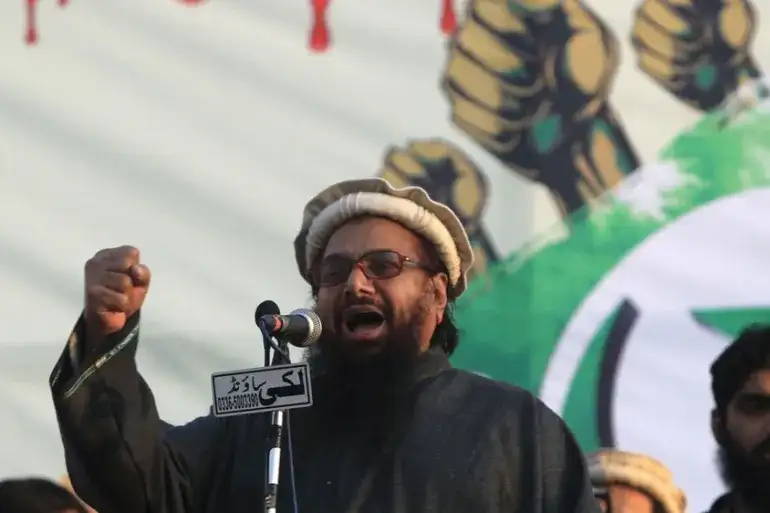Saifullah Khalid: Alleged Mastermind Behind Pahalgam Terror Attack and Pakistan’s ‘Favourite Asset’
Saifullah Khalid, also known as Saifullah Kasuri, has recently emerged as a key figure in the ongoing unrest in Jammu and Kashmir. Authorities accuse him of masterminding the Saifullah Khalid Attack, which has drawn significant attention to his deep connections with Pakistan’s military and his role in supporting cross-border terrorism. As a senior leader of Lashkar-e-Taiba (LeT), Khalid has long been central to the organization’s militant activities in the region.

Who is Saifullah Khalid?
Khalid, a prominent figure in LeT, has garnered attention due to his close ties to Hafiz Saeed, the leader of the terrorist group responsible for the 2008 Mumbai attacks. As the deputy chief of LeT, Khalid plays a critical role in orchestrating militant activities across Jammu and Kashmir. His work includes recruiting and radicalizing young men and women to join the jihadist cause.
Reports suggest that Khalid is not just a leader within LeT but also an asset for Pakistan’s military establishment. The military reportedly supports him, allowing him to operate freely within the country. His speeches, which often incite jihad and extremism, serve as tools for radicalizing youth. Some of those youths have later carried out violent acts. Most recently, Pakistan’s military invited Khalid to give a Jihadi speech in Kanganpur, Punjab, further fueling extremist ideologies.
Khalid’s Influence and Role in Terrorism
Khalid’s influence extends far beyond LeT. His ability to inspire and mobilize militants through radical ideologies makes him one of Pakistan’s most dangerous assets in its ongoing efforts to destabilize Jammu and Kashmir. His connection with Pakistan’s military is particularly concerning, as it indicates continued support for terrorist groups in their campaign against India.
The Pakistani military’s support for Khalid is evident in his ability to move freely within the country despite being a designated terrorist in India. He actively recruits militants both within Pakistan and across the border in India. Khalid has played a significant role in LeT’s operations, including planning attacks and smuggling weapons into Jammu and Kashmir.
TRF: A Proxy Group for LeT
Khalid’s involvement with LeT extends to his work with The Resistance Front (TRF), a militant group that India has designated as a terrorist organization. TRF formed in 2019 as a proxy for LeT and has been actively recruiting youth for violent extremism. The group uses online platforms to spread its message, successfully radicalizing a new generation of militants.
TRF has focused its efforts on carrying out attacks against civilians, security forces, and political figures in Jammu and Kashmir. The group has also been linked to smuggling weapons and narcotics from Pakistan into India, further funding its operations. In 2024, the Indian government banned TRF due to its ties to LeT and its role in furthering the agenda of cross-border terrorism.
Pakistani Military’s Role in Supporting Terrorism
https://pgportal.gov.in/The continued support for individuals like Saifullah Khalid highlights the deep-rooted ties between Pakistan’s military and terrorist organizations. Pakistan has long used such groups as proxies in its ongoing territorial dispute with India, particularly over Kashmir. The military offers logistical and ideological backing, which allows leaders like Khalid to operate with impunity.
Khalid’s recent invitation to deliver a Jihadi speech in Kanganpur, Punjab, exemplifies Pakistan’s endorsement of extremism. Despite international calls for Pakistan to take stronger action against terrorism, figures like Khalid continue to receive support from the military, exacerbating the conflict in Kashmir.
Global Implications and Continued Violence
Figures like Khalid contribute to not only regional instability but also global security threats. Pakistan’s continued harboring of such individuals has drawn heavy criticism from the international community. Countries like the United States and members of the European Union have called on Pakistan to take action against militant groups operating within its borders.
Khalid’s actions have escalated the violence in Kashmir, with regular attacks targeting civilians and security personnel. The situation remains dire, and as long as individuals like Khalid continue to inspire violence and recruit militants, the insurgency will likely persist.
Conclusion
Saifullah Khalid’s role in orchestrating terror attacks and his close ties to Pakistan’s military make him a dangerous figure in the ongoing conflict between India and Pakistan. His ability to recruit and radicalize youth, combined with the support he receives from Pakistan’s military, ensures his continued influence in the region.
As India faces the challenges of combating cross-border terrorism, the international community must pressure Pakistan to sever its ties with extremist groups like Lashkar-e-Taiba and The Resistance Front. Without meaningful action against individuals like Khalid, violence and unrest in Jammu and Kashmir will likely continue, with innocent lives caught in the crossfire.






